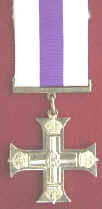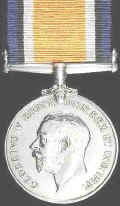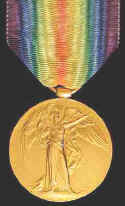 |
WILLIAM "FIGHTING
MAC" McKENZIE
William
McKenzie (1869-1947) was a man of principle and courage.
He was one
of many Salvationists who gained prison sentences for
conducting street marches in McKenzle's case, a week of
incarceration in Charters Towers, Queensland with his comrade,
Lieut Morrison.
McKenzie. who served in
various appointments including a stint on the War Cry magazine
staff is better known as a pioneering chaplain to the 4th
Battalion of the Australian Infantry in the First World War
and - later - a leader of the Army who gained the high rank of
Commissioner.
"Fighting Mac', as he
was known to the troops, was awarded the Military Cross for
his personal bravery and
spirit of sacrificial service.
General (Mrs) Minnie
Carpenter recorded that: "Chaplain McKenzie made Christ
real to thousands of men. Up and down the fire-swept ridges he
followed them, carrying food and water., tramping miles for
their mail; by night cutting steps over treacherous patches
which the boys must travel in the morning, Praying with them,
helping them to live., supporting them as they died. Burying
literally hundreds of brave lads fallen in battle, he spent
far into the night in his dim dugout, writing to their
relatives."
|
| Melbourne,
1918. Chaplain Major William McKenzie, MC, of the
Salvation Army, who was attached to 4th Battalion, AIF, during
the 1914-18 war. |
 |
 |
 |
 |
| Military Cross |
1914/15 Star |
BWM |
Victory Medal |
| MARJORIE
SCOBLE
For 40 years Marjory Scoble
retained identity with Bethesda Hospital where she dedicated
her time and talent to this ministry, equipping herself in
many fields of nursing, tutorials and administration.
She worthily earned the
respect of her fellow nurses and the esteem of the medical
profession, and served as Matron of Bethesda for her final 13
years before retiring in 1973.
Her rewarding career began
as a teacher at the Oakleigh Central School from 1928 to 1932.
|
 |
Being called for full-time
service as a Salvation Army Officer, she entered the Melbourne
Training College in 1932 and upon graduation was appointed to The
Salvation Army's Bethesda Hospital to take up nursing.
As a nursing sister in the Australian
Army Nursing Service during World War 11, Captain Scoble had the
distinction of being one of the few women to have been awarded both
the Africa and Pacific Stars,
covering her military service for six years in the war zones of the
Middle East and New Guinea.
After the war Marjorie Scoble
received a Centaur Memorial Scholarship allowing her to obtain Diploma
qualifications, and attended the Salvation Army's international
College for Officers in London in 1956. In 1981 The Salvation Army
Nurses Fellowship recognised Lieut-Colonel Scoble's outstanding
contribution by presenting her with the "Centenary Nurse of
Distinction" award.
Her devotion to The Salvation Army's
Christian ministry, of which nursing was but a part, was evident to
all who came in contact with her. She was a capable leader and
speaker. In retirement she remained active until frailty overtook her.
- Lieutenant-Colonel Marjory Scoble
was "promoted to glory' in October 1969.
ARTHUR McILVEEN
Arthur McIlveen was
the second of The Salvation Army's officers to earn the sobriquet
"Mac" from Australian troops. He spent his boyhood mining
tin and became a Christian in a lonely camp in the Queensland bush.
As a young Salvation
Army officer, had also applied to go as a chaplain to the Great War.
His boss, Commissioner Hay, had been afraid to appoint him, however,
as - knowing McIlveen's willingness to go into danger - Hay feared
"he would not see the war out for an hour before being shot
down".
One of the more
unusual acts of Mac's pre-WWI ministry was to campaign successfully
against a women's wrestling match in Broken Hill, NSW, which he saw as
an assault against the dignity of womanhood. As a result of his
protests the bout was cancelled.
 |
During the Second
World War, with the Rats of Tobruk, Brigadier Arthur McIlveen
came into his own. Along with several other brave
Salvationists - men serving as chaplains and Red Shield
representatives - McIlveen defied imminent death to "be
Jesus - to the men he served". |
The Commanding
Officer of the A1F's 29th Battalion wrote to The Salvation Army to
commend its work, stating that "your Brigadier McIlveen was
probably the most blitzed man in Tobruk; in the Red Shield store or
out of doors he did his duty, regardless of danger".
 |
| Tobruk,
1941-04-25. Salvation Army and AIF personnel loading
Comforts Fund items on to a truck for distribution to the
troops; on the ground from left to right are Brigadier
Arthur McIlveen (Salvation Army), Major Mawson
(Salvation Army), VX8992 Sergeant Lindrea (AIF), NX15271 Lance
Corporal Lane (AIF) and Adjutant Jock Geddes (Salvation Army).
(negative by F. Hurley.) |
The Rats of Tobruk
remembered Mac's kindness and compassion and, years later, raised
the money to buy a cottage in which Mac lived in retirement.
The Rats of
Queensland wrote to Mac that 'You had so little to give, yet your
constant smile, faith in victory, courage and complete disregard of
your own comfort at all times, your humility, self-effacement and
driving force took you far beyond the call of extraordinary
duty."
|